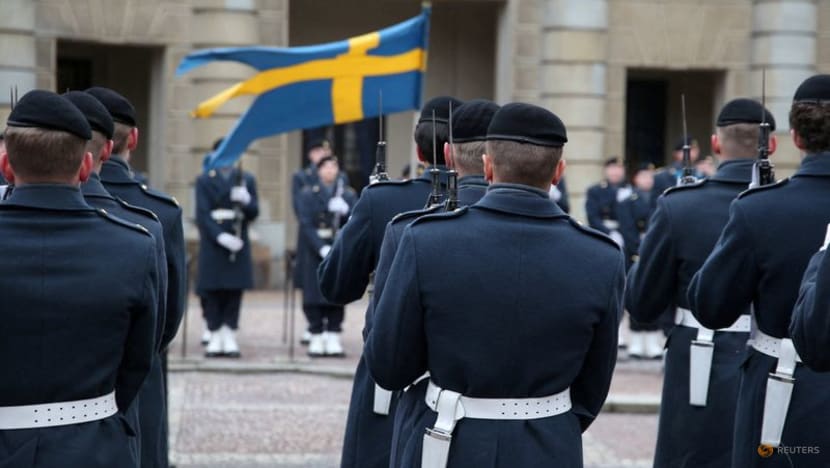Hungary's parliament ratifies Sweden's NATO bid, removing last barrier

Swedish soldiers take part in the changing of the guard ceremony in the courtyard of the Royal Palace in Stockholm, Sweden, on Feb 24, 2024 (Photo: REUTERS/Tom Little)

This audio is generated by an AI tool.
BUDAPEST: Hungary's parliament has ratified Sweden's bid to join NATO, clearing the last major obstacle to membership on Monday (Feb 26).
It brought an end to more than 18 months of delays by the nationalist government in Budapest that have frustrated Hungary’s allies. All existing NATO countries must give their approval before a new member can join the alliance. Hungary was the only hold-out.
WHY DOES SWEDEN WANT TO JOIN NATO?
Sweden has stayed out of military alliances for more than 200 years and long ruled out seeking NATO membership. But after Russia's full-scale invasion of Ukraine in February 2022, it ditched its longstanding policy of nonalignment almost overnight and decided to apply to join the alliance together with neighbouring Finland.
Both Sweden and Finland, which joined the military alliance last year, had already developed strong ties with NATO after the end of the Cold War, but public opinion remained firmly against full membership until the war in Ukraine.
Nonalignment was seen as the best way to avoid tensions with Russia, their powerful neighbour in the Baltic Sea region. But the Russian aggression caused a dramatic shift in both countries, with polls showing a surge in support for NATO membership.
Political parties in both Finland and Sweden decided they needed the security guarantees that only come with full membership in the US-led alliance.
TÜRKIYE REQUIRED CONDITIONS TO ACCEPT SWEDEN
While Finland became NATO’s 31st member in April, Sweden’s application has been held up. All alliance members but Türkiye and Hungary gave their thumbs up. On Jan 23, Turkish legislators voted in favour of Sweden’s membership in NATO.
To let Sweden join, Turkish President Recep Tayyip Erdogan put forth a series of conditions including a tougher stance toward groups that Türkiye regards as threats to its security, such as Kurdish militants and members of a network it blames for a failed coup in 2016.
Although the Swedish government tried to appease Erdogan by lifting an arms embargo on Türkiye and promising to cooperate in fighting terrorism, public demonstrations in Sweden by supporters of the outlawed Kurdistan Workers’ Party, or PKK, and by anti-Muslim activists who burned the Quran complicated the situation.
Pressure from the US and other NATO allies on Türkiye to remove its objections to Swedish membership appeared to have little effect until Erdogan said at a NATO summit last year that he would send the documents to parliament for approval.
But the issue was held up in parliament until lawmakers finally held a vote on the issue and ratified Sweden's accession protocol. The Turkish government finalised the step by publishing the measure in an official gazette.
HUNGARY HAS KREMLIN-FRIENDLY STANCE TO UKRAINE INVASION
Now the parliament in Hungary has ratified Sweden’s bid to join NATO, bringing an end to more than 18 months of delays by the nationalist government.
Initially, Hungary didn’t give any clear reason for its delays and Prime Minister Viktor Orbán long insisted that his country wouldn’t be the last to approve. But the tone towards Stockholm hardened last year, with Hungary accusing Swedish politicians of telling “blatant lies” about the condition of Hungary’s democracy.
Orbán has broken ranks with NATO allies by adopting a Kremlin-friendly stance toward Russia’s invasion of Ukraine.
The inclusion of Sweden would leave the Baltic Sea almost surrounded by NATO countries, strengthening the alliance in the strategically important region. The Baltic Sea is Russia’s maritime point of access to the city of St Petersburg and the Kaliningrad enclave.
Sweden’s armed forces, though sharply downsized since the Cold War, are widely seen as a potential boost to NATO’s collective defence in the region. The Swedes have a modern air force and navy and have committed to increase defence spending to reach NATO’s target of 2 per cent of gross domestic product.
Like the Finns, Swedish forces have for years participated in joint exercises with NATO.
"UNPREDICTABLE RUSSIA"
Not surprisingly, Moscow reacted negatively to Sweden and Finland’s decision to abandon nonalignment and seek NATO membership, and warned of unspecified countermeasures.
Russia said the move adversely affected the security situation in Northern Europe, which it said ”had previously been one of the most stable regions in the world.”
Earlier this year, Sweden’s top military commander Gen Micael Bydén said all Swedes should mentally prepare for the possibility of war, and on Feb 19, Thomas Nilsson, head of Sweden's external intelligence service, MUST, said that "the situation has continued to deteriorate during 2023”.
"In the event of NATO membership, we must have the capability through an alliance to counter a revanchist and unpredictable Russia," the agency said in its assessment.
Both Sweden and Finland have warned of an increased risk of Russian interference and hybrid attacks.












